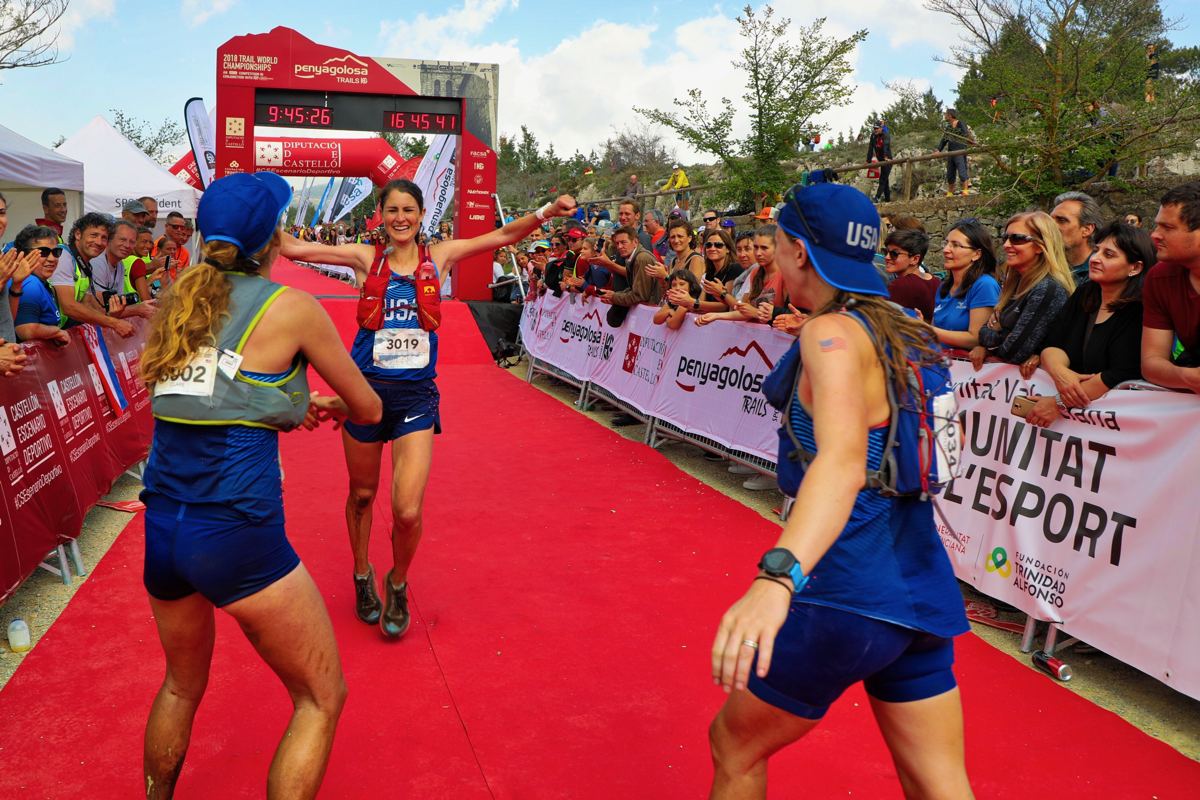It is 2018. I am in the back of a van full of athletes headed down a mountain, along twisty roads in the Valencia region of Spain. We are decked out in American team gear, eating snacks, and chatting about athlete contracts — marketing trends in the sport, the latest news about athletes signing with various brands, and (in general terms, so as not to violate our Non-Disclosure Agreements) what runners are being offered.
I am grateful for this conversation. The mountain roads are frightening, and I welcome the distraction. But I am also grateful because frank discussions about the business side of the sport are rare. At least, they are rare in my experience.
It may be different for runners who live in training hubs like Boulder, Colorado, or Flagstaff, Arizona, or for those who have elite or professional runners as training partners. But this does not describe my situation. I am an academic nomad; my geographic location is dictated entirely by the university I happen to attend. I do not live near any other professional runners, and I have never had the opportunity to discuss contracts with my peers in the sport.
I have no idea what I should be looking for in a contract — what is customary or what is fair. I do not know which companies are lowballing athletes, or which ones have a reputation for paying female athletes less money than male athletes. This discussion is one I have been craving, and I sit quietly, taking it all in.

Sabrina Little (center) with Team USA’s Clare Gallagher (left) and Kaytlyn Gerbin (right) at the 2018 Trail Running World Championships in Spain. Photo: iRunFar/Bryon Powell
The Mysterious World of Running Contracts
There are certain mysteries of the world that are fun and exciting. Consider black holes, aliens, and the Loch Ness monster. But I am not sure why running contracts are among them. Surely, it is not to our benefit that we do not know our worth. Certainly, it would help the sport to mature and professionalize if the process of signing contracts was not enshrouded in mystery, or if there were more transparency about the terms we are agreeing to. And, morally speaking, we might wonder whether the hidden nature of these processes permits hypocrisy with respect to one’s professed values.
For example, does a company publicly affirm inclusion, yet offer lower contracts to those who do not fit a certain mold? Do athletes claim that they prioritize treading lightly on the planet, yet sign contracts that demand or incentivize multiple transcontinental flights per annum? Are companies genuinely hospitable to women having children mid-career? Or is this empty rhetoric that does not bear out in terms of the practical support and patience extended to athletes in their return to racing?
There is much to be said about the business-side of contracts, but not by me — a philosopher. In what follows, I will raise some ethical considerations of running contracts. These are factors that an athlete might consider before signing on with a company.
Does Signing with This Company Undermine Your Integrity?
I mean this in two senses.
First, does a runner really like the product? If not, this is unlikely to be a fruitful partnership for either party. There are performance repercussions for wearing gear you are uncomfortable in, and there are costs to your integrity. You are telling people to buy something that, in other circumstances, you would not buy yourself.
I sometimes hear whispers about runners who represent one company, yet train in other shoes. And I get it. It is flattering when a company extends an offer — or communicates that they see your value. Moreover, runners are not often in a position of power to choose the company they most prefer. But if you are in the position to pursue a better fit, wait on it. Align with a company you can partner with, with your integrity intact.
Second, are there commitments a runner holds dear, which will be compromised in aligning with a certain brand? For example, we are in a pickle as runners. We love the outdoors, so we are inclined to think about ecological impact. Yet some of the best competition is found abroad.
Everyone’s decision-making is different here, regarding how to weigh carbon emissions and race participation. But this is certainly worth thinking about during contract negotiations. You may need to look at which races are being incentivized, which are required, and how these terms square with your conscience regarding your ecological footprint.

Elite runners at the start of the 2022 UTMB on Friday, August 26, 2022, each wearing distinctive branded kit. Photo: iRunFar/Kirsten Kortebein
Where Will Your Attention Go?
What is reinforced in your contract is what you learn to pay attention to. If you are being reinforced in terms of posting a lot on social media and having strong race performances, first, these objectives will shape your habits of attention. Second, you may start to think of yourself as having value only with respect to these things.
To be clear, neither of these measures is inherently bad. Of course, successful racing is reinforced in a professional running contract. This aligns with what athletes generally want to do anyway — to excel in their craft.
Moreover, athletics has always been performative, or ordered to the spectator (1). In a social world that is increasingly online, naturally, spectatorship has entered digital spaces. Professional athletes toggle between two tasks — athletes and marketers — and having a presence online seems an appropriate expectation.
Even so, participating in image-making, as we do online, has at least two costs. First, it is easy to invest more attention into “seeming” over “being,” or reputation over substance. We may start to care more about what people say about us, than about who we actually are.
Second, being marketed online inclines us to answer to the masses — to the many, rather than the few. Receiving many “likes” or attention online is not a proxy for measuring value. It is not a solid ground for preserving one’s integrity. With these things in mind, it is important to have a few people who really know you — who love you and who have your best interest at heart — speaking into your life. Answer to these people.
Is This Contract Just?
An athlete in contract negotiations will want to be fairly compensated for the value he or she brings to a company. This is a matter of justice. However, that singular athlete is not the only person who will be impacted by the terms of a contract.
On that perilous trek down the mountain in Spain, one of my teammates pointed out the following: Maybe you do not feel confident negotiating a higher contract for yourself. (Maybe you just feel grateful to receive a contract in the first place!) But accepting less than your value makes it easier for companies to lowball other athletes. For example, why would a company pay an athlete a full salary if another athlete is willing to do the same work, just to receive free shoes? All athletes have a role to play in setting sponsorship norms, and in making the sport a viable career, with sufficient support.
How Does This Contract Square with Your Vision of a Good Life?
I think sometimes achievers are inclined to accept the terms of success dictated by other people, without asking the question of how these terms square with one’s own vision of a good life.
In my early days in the sport, I raced everything, everywhere, always, because I thought this was what was expected of me. And maybe it was. But doing so made me less present with my friends and family, less able to pursue intellectual goods, and less receptive to different experiences. It made my world smaller.
Professional running contracts likely represent a short season of one’s life. And it would be unfair to ask a brand partnership to be ordered to your flourishing, in terms that extend beyond running. But if your set of competencies and interests misalign with the terms of success reflected in a contract, you may feel frustrated and unable to thrive under those terms. At the very least, thinking about your life in grand terms — and about where professional running fits in — is worth considering.

Sabrina Little, adjusting to a different pace. Supporting female athletes throughout and after pregnancy is one area in which some companies will excel over others. Photo courtesy of Sabrina Little.
Final Thoughts
I realize very few people sign running contracts, so these considerations may seem of little material consequence for many. But professional athletes are like rudders of a ship. They play a role in directing attention, set norms regarding travel and the prestige of certain races, and serve as exemplars for many participants in the sport. We should all care what contracts say, and about what athletes are agreeing to, because these partnerships will shape the world of trail running and ultrarunning, moving forward, for good and for ill.
Call for Comments
- What are your thoughts on running contracts and the professionalization of the sport?
- Do you think it’s beneficial to help the sport grow?
References
- See Diogenes’ Laertius’ Lives of the Eminent Philosophers 6 to 8. He describes Pythagoras’ image of the soul, in which the athlete is ordered toward fame. Although, I guess we do not need Pythagoras to tell us there is something performative, or entertainment-oriented, about sports. We watch sports largely for entertainment, and this is a major source of revenue in athletics.
